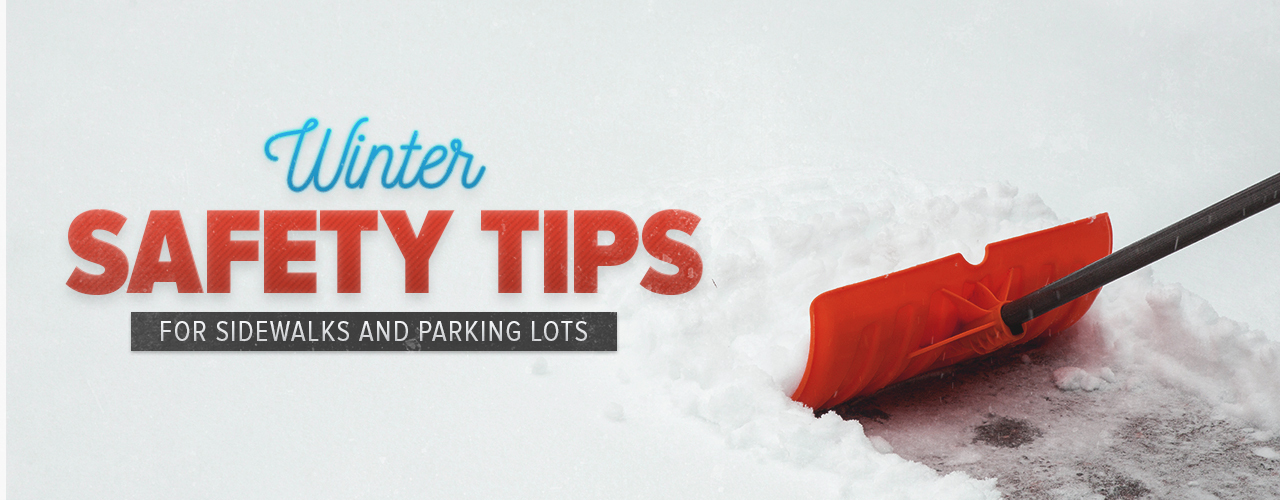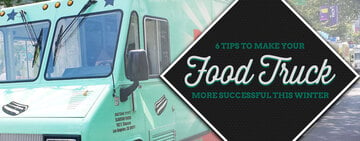Winter Safety Tips for Sidewalks and Parking Lots
For many businesses, the start of winter marks the beginning of a slow season with reduced sales. In many parts of the country, it also results in snowy and potentially dangerous conditions. Poor weather increases the risk of accidents, which can create a crisis for your business. To prevent any employees or customers from injuring themselves in your snowy parking lot, we’ve created a list of outdoor winter safety tips for the workplace.
Winter Safety Tips
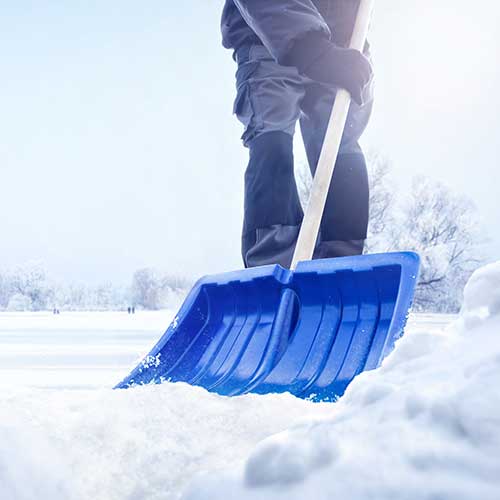
Staying on top of the winter weather can help the season pass painlessly for your business, and turn your business into a safer winter destination for customers. Properly taking care of your property during the winter months helps avoid dangerous conditions such as an icy parking lot. Here are four helpful winter weather safety tips to ensure you have a safe winter season:
1. Know Who's Responsible for Clearing Your Parking Lot and Sidewalks
Before inclement weather sets in, it’s important to know who is responsible for clearing your sidewalks and parking lots. If you own the property, this responsibility is likely yours. However, if you have a landlord, it’s up to them to coordinate clearing these areas out. Failure to clarify this information could result in slippery, dangerous conditions that leave you vulnerable to personal injury lawsuits. If you're unsure who is responsible for snow removal, check your business's lease agreement.
2. Hire a Contractor
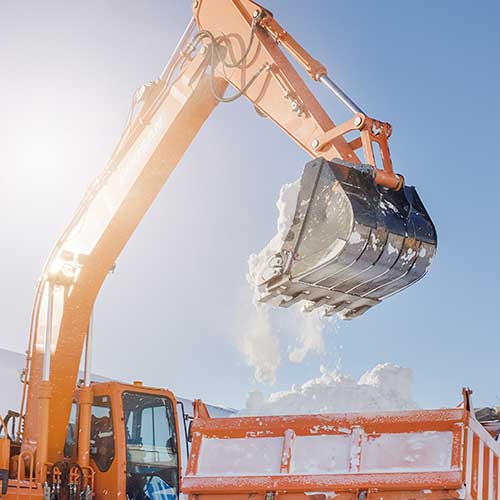
Although many small businesses choose to clear sidewalks themselves, a majority of large franchises and chains hire contractors to clear snow and ice. This step is essential for any business that has a large parking lot or an area that's prone to freezing over.
When hiring a contractor, be sure to find a reputable, trustworthy company well before the first snowfall. By hiring an outside vendor to perform these duties, you can eliminate the stress of completing certain tasks, such as clearing out snow and salting the parking lot, before your business opens. As you hire a snow removal company, be sure to consider these tips:
- Check their credentials: Make sure the contractor presents a valid and current certificate of insurance and make photocopies for your records.
- Require Insurance: Ask the contractor to place your business on their general liability, automobile liability, and workers’ compensation insurance policies as a certificate holder.
- Outline your parking lot: Show the contractor the locations of all obstructions in the parking lot, including parking stops, speed bumps, curbs, poles, and water drains. This will prevent the destruction of your property and protect the contractor's equipment.
- Mark obstructions: Mark the obstructions listed above with bright sticks or flags so they stand out when covered in snow.
- Choose where to dispose of snow: Communicate with the contractor and agree on a safe place for excess snow to be dumped.
3. Follow Local Regulations
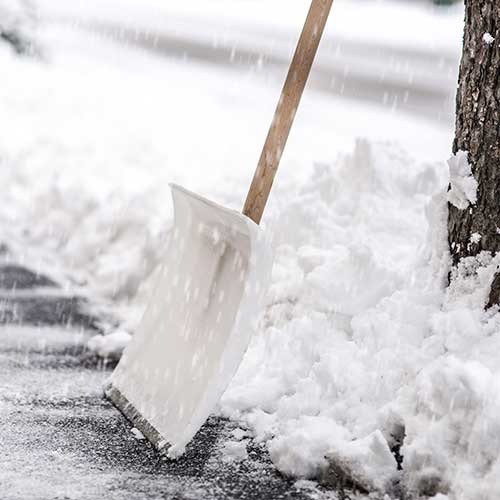
Whether you're hiring a snow removal contractor or taking the task on yourself, you must know where excess snow can legally be piled. Snow removal regulations vary depending on the city, county, and state you live in, so check with your local government in advance. While regulations may vary, there are some general rules you should follow:
- Avoid foot traffic areas: Snow must be piled away from customer and vendor foot traffic areas, including sidewalks, loading docks, dumpsters, entrances, and exits. Also, avoid piling it near mailboxes, water drains, gas meters, and fire hydrants.
- Stay away from traffic: Snow piles should be positioned so that melted snow does not flow into high-traffic areas. If it does, it may freeze and form a sheet of ice.
- Maintain visibility: Snow piles should not inhibit the visibility of guests or vendor drivers as they enter or leave your parking lot.
- Target storm drains: Water should flow freely and storm drains should be free of any obstructions.
- Avoid obstructing other buildings: Snow should never be piled on the nearby property of residences or businesses.
- Transport snow correctly: Never push snow across a road without knowledge of your local ordinances.
4. Stock Up on Winter Storm Supplies
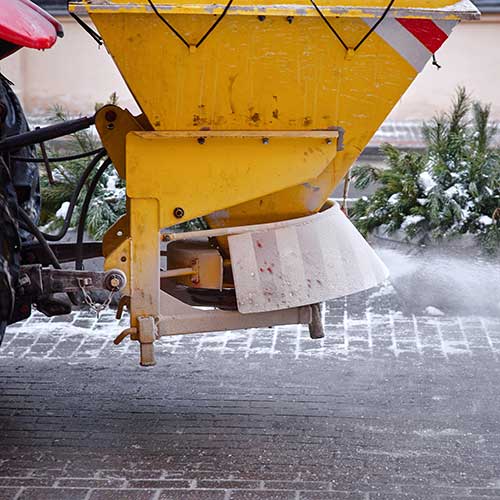
When you operate any type of business, it’s important to be prepared for the worst-case scenario. If a storm rolls through that's larger than anticipated, the plow trucks are backed up, and snow starts falling in the middle of the day, you can be prepared by stocking safety supplies. We’ve provided a list of emergency supplies your business should have on hand in case of inclement weather:
- Keep a large supply of ice melt readily available.
- Invest in high-quality shovels to clean up snow or snowdrifts.
- Set out caution signs or cones in possible hazardous areas. Entranceways can often become slippery since foot traffic carries in snow and ice.
- Provide reflective safety vests to any employees shoveling your parking lot. Increased visibility reduces the risk of injury.
Sidewalk and Parking Lot Winter Safety FAQ
Below we answer the most common questions regarding keeping your sidewalks and parking lots safe for the winter:
Should I Put Salt Down Before or After It Snows?
Rock salt is intended to be used before snow falls. Pre-salting sidewalks and parking lots creates a layer of salt between the surface and the falling snow. This extra layer helps prevent snow from freezing to the ground, making it easier to shovel and remove snow.
How to Prevent Ice on Sidewalks?
One of the best ways to prevent ice buildup on sidewalks is by utilizing a combination of salt and sand before the snowstorm hits. The salt and sand act in different ways and complement each other, making ice easier to clear and surfaces less slippery. Additionally, clearing snow away as soon as possible before it sticks and freezes can also help prevent major ice buildup.
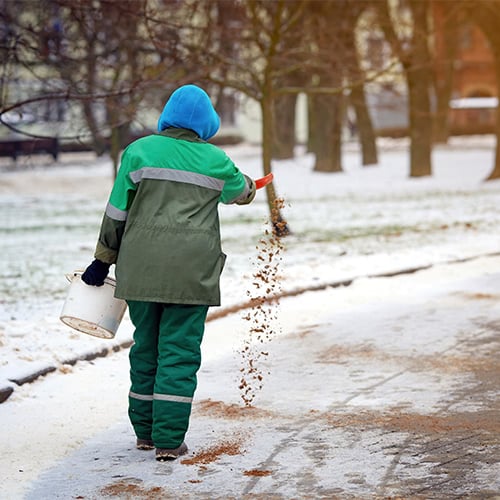
How to Treat Icy Sidewalks?
If ice has already set on your sidewalk or parking lot, rock salt is still able to be used as a de-icer. Although it may not be as effective as it would be if it were applied preemptively, salt still can melt ice. Utilizing other products like sand, wood chips, and clumping cat litter are also options to melt ice or add extra traction.
Is It Better to Shovel Snow before Ice?
If you’re expecting freezing rain or other forms of icy precipitation after a snowfall, then it's best to wait to shovel. While shoveling snow before it sets is normally the way to go, this isn’t the case with freezing rain and sleet. Freezing rain turns to ice immediately after making contact with a surface, so if snow is shoveled away, your parking lots and sidewalks will become exposed and accumulate a large amount of ice. It’s better to let the freezing rain fall on snow and form a top layer, allowing you to shovel both once precipitation stops.
Why Shovel Your Driveway?
Not shoveling your driveway, parking lot, or sidewalk creates a hazard for customers and employees, which could lead to falls or other accidents. Additionally, failing to shovel your parking lots and sidewalks can lead to major damage. As ice melts, water enters cracks and crevices in the ground. When this water refreezes, the ice expands and enlarges the cracks, causing more damage.
To make sure your business gets through the winter season safely, start planning before the snow starts to fall. Be prepared to deal with excess snow and stock up on winter safety equipment like rock salt, safety apparel, and shovels. Teach your staff common safety acronyms so they understand how to communicate in high-risk situations. Once you have a winter safety plan in place, you can focus your attention on attracting customers with winter promotions.
